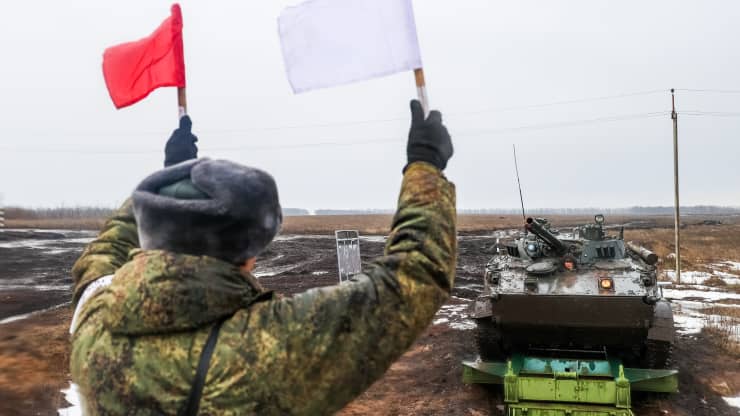
Erik Romanenko | TASS | Getty Images
Moscow is starting to return some troops at the Ukrainian border to their bases, the Russian government announced Tuesday — but Western officials have urged caution over taking Russia’s claims at face value.
In a statement early on Tuesday, Igor Konashenkov, a spokesman for the Russian Ministry of Defense, said troops that had recently been posted to Russia’s southern and western military districts — which share a border with Ukraine — had completed their military drills and “have already begun loading onto rail and road transport and will begin moving to their military garrisons today.”
Konashenkov also announced that Russian troops currently engaged in military drills in neighboring Belarus, which shares a border with Ukraine to the latter’s north, would return to their permanent bases when the exercises ended on Feb. 20.
Thousands of Russian troops began engaging in military drills last week in a move that was widely seen as a display of strength by Moscow. The drills came as more than 100,000 soldiers, tanks, missiles and even fresh blood supplies had been moved to Russia’s border with Ukraine.
Moscow has repeatedly insisted it has no plans to invade Ukraine, despite warnings from Western countries in recent days that an invasion is likely to be imminent.
The Kremlin said Tuesday that Russia had always said its troops would return to their bases after participating in military exercises, Reuters reported.
Dubbing U.S. warnings that Moscow would launch an attack on Wednesday “baseless hysteria,” a Kremlin spokesperson said tensions had been exacerbated by a huge buildup of Ukrainian forces and U.S. claims that war was imminent, according to the news agency.
‘No sign of de-escalation’
However, NATO chief Jens Stoltenberg told a press conference on Tuesday that while there was reason for “cautious optimism” over the situation in Ukraine, the military alliance so far had “not seen any sign of de-escalation on the ground from the Russian side.”
“Russia has amassed a fighting force in and around Ukraine unprecedented since the Cold War,” he said. “Everything is in place for a new attack. But Russia still has time to step back from the brink, stop preparing for war and start working for a peaceful solution.”
Read more: Russia is willing to go to war and incur sanctions over Ukraine, analysts warn
NATO has not received any response from Russia regarding its request for a meeting to discuss the current situation, Stoltenberg told reporters, adding that any move from Russia into Ukraine would violate international law.
He added that Russia’s continued efforts to destabilize Ukraine, through its annexation of Crimea in 2014 and support of Russian separatists in the country, as well as the current buildup of troops along the Ukrainian border and near NATO territory, meant the organization may need to consider making long-term security adjustments.
Meanwhile, a spokesperson for the U.K.’s Foreign Office told CNBC in an email that Britain will “judge the Russians by their actions not their words.”
Win for the West?
Timothy Ash, senior emerging markets sovereign strategist at BlueBay Asset Management, said in a note Tuesday that “if Putin has really blinked, this would be huge win for Biden, [Ukrainian President Volodymyr] Zelenskyy and the West,” adding that it would be difficult to see the entire situation as anything but a big defeat for Putin.
“What did he achieve?” he said. “He managed to rally the West back around NATO, which again has common purpose. Ukrainian sovereignty [has been] affirmed, even strengthened.”
Read more: Ukraine calls for meeting with Russia as U.S. warns of imminent attack
As a result of Russia’s aggressive activity, Ukraine’s military was now better armed and better able to defend itself, Ash added.
“Russia has been called out as an unreliable energy supplier — the West will accelerate diversification away from Russian energy sources,” he said. “Some will say [Putin] was the Russian leader who actually lost Ukraine. That will be his mark in history — he accelerated Ukraine’s Western orientation.”
Diplomacy ‘far from exhausted’
In a televised exchange on Monday, Russian Foreign Minister Sergey Lavrov told President Vladimir Putin that the avenues the Kremlin could use to secure the security guarantees it has demanded — including diplomacy — “are far from exhausted.”
While Lavrov suggested continuing along the diplomatic route, he added: “We have already warned more than once that we will not allow endless negotiations on questions that demand a solution today.”
Russia is demanding that Ukraine never be permitted to become a NATO member, and has said it wants the organization to roll back its presence in Eastern Europe.
Addressing the Ukrainian population on Monday, the country’s President Volodymyr Zelenskyy said Ukraine “wants … to resolve all issues exclusively through negotiations.” But he added that Ukraine could respond to any aggression with its “great army” that has “unique combat experience and modern weapons.”
In a phone call on Monday, U.S. President Joe Biden and U.K. Prime Minister Boris Johnson agreed that “a crucial window for diplomacy” still remained, reiterating that a significant package of sanctions — including reducing European countries’ reliance on Russian gas — would be imposed if Russian aggression escalated.
Polish Foreign Minister Zbigniew Rau — the current chairman of the Organization for Security and Cooperation in Europe — is due to convene talks in Moscow on Tuesday between Lavrov and the OSCE’s chairperson-in-office in Ukraine, Mikko Kinnunen.
Meanwhile, German Chancellor Olaf Scholz is in Moscow on Tuesday to meet with Putin. Scholz met with Zelenskyy in Kyiv on Monday.
Despite the Kremlin doubling down on its claims that Russia doesn’t have plans to invade Ukraine, the U.S. and its allies have been warning that an invasion could happen “any day now.” Secretary of State Antony Blinken ordered the U.S. Embassy in Kyiv to close on Monday, relocating staff to the city of Lviv in western Ukraine.

